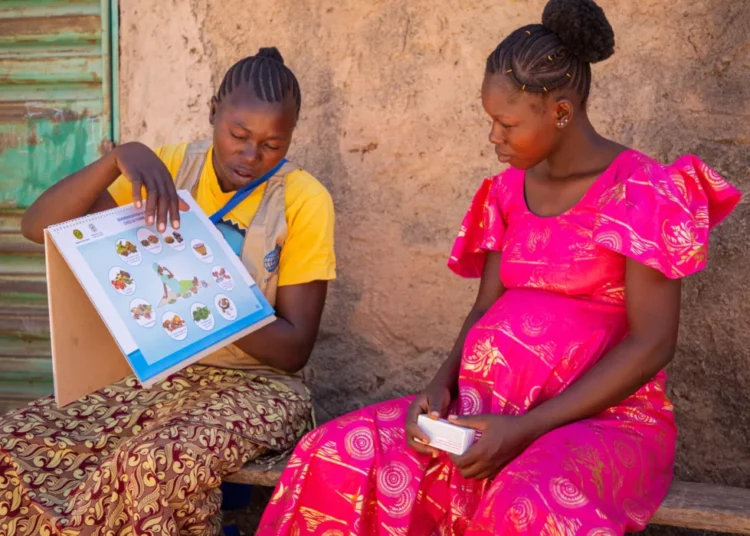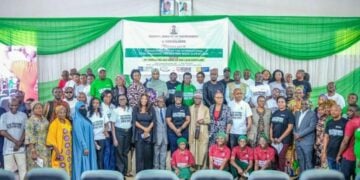For decades, Africa has been home to heartbreaking statistics; women bleeding to death after childbirth, newborns lost to preventable infections, and children dying from malnutrition before their fifth birthday.
Despite countless interventions and funding streams, the numbers remain unacceptably high.
However, health experts, policymakers, and researchers recently converged with a mission to stop women and children from dying needlessly.
It was the first-ever Regional Think Tank Meeting on Accelerating Implementation for Maternal, Newborn, Child, Nutrition, and Health (AIM-MNCH), a bold initiative to bridge the gap between research and real-world impact in Africa’s health systems
Speaking at the event, the Director, Reproductive Health at Federal Federal Ministry of Health, Dr. Samuel Oyeniyi said “We are all accelerators. If we leave this work to one partner, challenges will sweep away the progress. Every hand must be in this, ” he said.
Postpartum hemorrhage (PPH), or excessive bleeding after childbirth, remains the leading cause of maternal death globally. It kills one woman every six minutes, most often in low-resource settings.
For years, global guidelines on managing PPH existed — but implementation lagged. Health workers relied on visual estimates of blood loss, leading to fatal delays.
“When someone sees blood on the floor, they may guess 200 milliliters; another might say 1,000,. That inconsistency meant women were bleeding to death before anyone acted, ” explained Dr. Taiwo Amole of the African Center of Excellence for Population Health and Policy (ACEPHAP).
The E-MOTIVE Trial, conducted across Nigeria, Tanzania, Kenya, and South Africa, changed that. By using a simple calibrated drape to measure blood loss and introducing a “First Response Bundle” including oxytocin, uterine massage, IV fluids, tranexamic acid, and immediate escalation of care maternal deaths from bleeding were slashed dramatically.
The findings were so compelling that the World Health Organization (WHO) updated its guidelines within months, and Nigeria became the first country to adopt and roll out the recommendations nationally.
Under the leadership of the Federal Ministry of Health and partners such as TA Connect, CHAI, Solina, WHO, and the Bill & Melinda Gates Foundation, Nigeria developed its first National Guideline for PPH Prevention and Management.
Since then, 75 master trainers and nearly 900 frontline health workers have been trained, 40 hospitals upgraded as centers of excellence, and standardized PPH care protocols rolled out across 16 states.
For Dr. Oyeniyi, this success underscores one message: innovation must go hand in hand with coordination.
“Innovations without coordination can’t last. When we put technology and teamwork together, implementation becomes faster, feedback becomes real-time, and communities begin to feel the impact,” he warned.
At the heart of the Think Tank’s strategy is the belief that data and local production are as important as medicine.
Dr. Oyeniyi shared a harrowing story from Kano: a woman bleeding after childbirth, her husband sent repeatedly to buy missing drugs, until exhaustion, and tragedy, ended the ordeal.
“The placenta was out, the baby inside, and she was bleeding in a pool of blood,” he recalled. “The husband kept buying drugs one by one. By the time he gave up, she was gone.”
That story, he said, is a painful reminder that without essential commodities, even the best training fails.
He called on donors to step up: “Bring any quantity — Nigeria has the absorptive capacity. We need commodities. We need contraceptives.
We need data systems to guide our decisions.”
The ministry, he added, is already strengthening maternal nutrition, introducing competency-based training, and integrating care for pre-eclampsia, eclampsia, and maternal anemia into unified frameworks to avoid duplication.
According to Dr. Amole, the new Think Tank will serve as a “hub for evidence synthesis, policy dialogue, and capacity building.” It includes academia, ministries of health, civil society, funders, and technical experts, all working toward one vision: an Africa where maternal and newborn deaths are rare, not routine.
Among its core objectives are: providing evidence-based guidance to policymakers, supporting policy briefs and advocacy to fast-track adoption of proven interventions, strengthening health worker capacity through tailored training programs, facilitating regional knowledge exchange and documentation of best practices, we’ll look at what works in Tanzania, what’s working in Nigeria, and learn from each other,” Amole said. “Africa doesn’t lack policies — we lack coordination and scale.
Even as the continent makes strides, challenges persist. Oyeniyi lamented bureaucratic hurdles that stifle local innovation, citing the recent closure of a local facility producing calibrated drapes essential for PPH care.
“Without notice or warning, the plant in Ibadan was shut down. That’s the same product saving mothers’ lives in hospitals. We must overcome these internal barriers if we want to accelerate progress, he said.
“We have too many pilot projects that end where they begin. This time, we’re building systems that can scale not just projects, said Nigeria’s Principal Investigator for the landmark E-MOTIVE Trial and one of Africa’s most respected maternal health advocates, Prof. Hadiza Galadanci.
For Oyeniyi, Galadanci, and their peers, the mission is clear: to ensure that Africa not only adopts innovations but leads in producing and scaling them.




